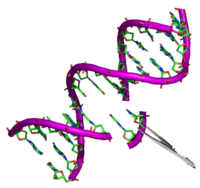
Photo from wikipedia
Abstract DNAzyme (DZ) compared to conventional antisense oligonucleotides have significant potential capacity in the treatment of cancer because of high selectivity and intrinsic catalytic efficiency. Considering the key role of… Click to show full abstract
Abstract DNAzyme (DZ) compared to conventional antisense oligonucleotides have significant potential capacity in the treatment of cancer because of high selectivity and intrinsic catalytic efficiency. Considering the key role of c-Myc oncogene in the progression of breast cancer, herein the β-CD polymer (β-CDP) is used to delivery of RNA-cleaving DZ which causes suppression of the c-Myc gene in MCF-7 cell line. The best suppression efficiency in the MTT viability assay, in a time and concentration-dependent manner obtained 24 h after transfection of 0.8 μM of the β-CDP/DZ complex (weight ratio 1:1). Results of Real-time-qPCR showed 1.7 fold decrease the expression of c-Myc mRNA after cell transfection of 0.8 μM inclusion complex. By flow cytometry analysis, apoptosis rate of cancer cells was high (45.6%), with a significant difference compared to control. Also synergistic effect of the β-CDP/DZ complex and different concentration of doxorubicin (DOX) was investigated. Results showed, inhibitory effect of cell proliferation of DOX in the presence of β–CDP/DZ complex is better than the free drug. Results suggested a potential platform in association with therapeutic potential of RNA-cleaving DZ for c-Myc oncogene inhibition in cancer therapy and indicated extremely efficient at delivery of β–CDP/DZ polyplex in the MCF-7 cell line.